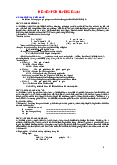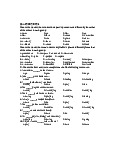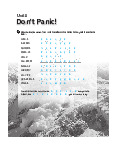





Preview text:
Meeting 5 PREDICATES1
I. THE SEMANTIC STRUCTURE OF SIMPLE DECLARATIVE SENTENCES II. PREDICATORS A. Role B. Parts of Speech III. ARGUMENTS IV.
PREDICATES VS. PREDICATORS V.
THE DEGREE OF A PREDICATE
I. THE SEMANTIC STRUCTURE OF SIMPLE DECLARATIVE SENTENCES
Task 1. In the following sentences, delete the referring expressions and write down the
remainder to the right of the example.
1. My dog bit the postman _____bit______
2. Mrs. Wraith is writing the Mayor's speech 3. Cairo is in Africa
4. Edinburgh is between Aberdeen and York 5. This place stinks 6. John's car is red
7. Einstein was a genius
The above sentences are simple declarative sentences. Typically such sentences contain one or
more referring expressions, plus some other words that do not form part of any of the referring
expressions. It is on these other words that we shall now concentrate. II. PREDICATORS A- ROLE
Task 2. Listed below are the remainders from the above examples (task 1). In each case, write
down the single word (or part of a word) which carries the most specific information. We have done the first one for you. 1. is writing write 2. is in 3. is between, and 4. stinks
1 Most of the tasks in this handout are taken from Semantics – A course book (Hurford et al., 2007) 5. is red 6. was a genius
______________________________________________________________________________
______________________________________________________________________________
______________________________________________________________________________
______________________________________________________________________________
Notice that the verb be in its various forms
(is, was, are, were, am) is not the predicator any
example sentence that we have seen so far. B- PARTS OF SPEECH
Task 3. Strip away referring expressions and the verb be (and possibly other elements) to
identify the predicators in the following sentences: 1. I am hungry 2. Joe is in San Francisco 3. The Mayor is a crook
4. The man who lives at number 10 Lee Crescent is whimsical
5. The Royal Scottish Museum is behind Old College
Task 4. Do you agree with the following statements?
1. The predicators in sentences can be of various parts of speech: adjectives , verbs, prepositions and nouns .
2. Words of other parts of speech, such as conjunctions (and, but, or), articles (the, a) cannot
serve as predicators in sentences III. ARGUMENTS
The semantic analysis of simple declarative sentences reveals two major semantic roles
played by different subparts of the sentence. These are the role of predicator, illustrated
above, and the role(s) of argument(s), played by the referring expression(s) Example: Juan is Argentinian
predicator: Argentinian, argument: Juan Juan arrested Pablo predicator: arrest, arguments: Juan, Pablo
Juan took Pablo to Rio predicator: take,
arguments: Juan, Pablo, Rio
Task 5. In the following sentences, indicate the predicators and arguments as in the above examples: 1. Dennis is a menace predicator: argument(s):
2. Hamish showed Morag his sporran predicator: argument(s):
3. Donald is proud of his family predicator: argument(s):
4. The hospital is outside the city predicator: argument(s):
IV. PREDICATE VS. PREDICATORS
A PREDICATE is any word (or sequence of words) which (in a given single sense) can
function as the predicator of a sentence. For example, hungry, in, crook, asleep, hit, show,
bottle, are all predicates and, or, but, not, are not predicates.
A predicate can have only one sense. Normally, the context in which we use a word will make
what sense (what predicate) we have in mind.
For example, the word bank has
(at least) two senses. Accordingly, we might speak of the
predicates bank1 and bank2. Task 6. Are the following predicates? 1. dusty 2. drink 4. You 3. woman 5. Fred 6. about Task 7.
Fill in the blanks with given words predicate predicates predicator predicators The term '
'(1) identifies elements in the language system, independently of
particular example sentences. Thus, it would make sense to envisage a list of the
(2) of English, as included, say, in a dictionary. The term ' '(3) identifies the
semantic role played by a particular word (or group of words) in a particular sentence. In this
way, it is similar to the grammatical term 'subject': one can talk of the subject of a particular
sentence, but it makes no sense to talk of a list of 'the subjects of English': similarly, one can talk of the '
' (4) in a particular sentence, but not list 'the (5) of
English'. A simple sentence only has one
(6), although it may well contain more than one instance of a (7).
Task 8. Answer the following questions
1. What are predicator and predicate in the following sentence?
A tall, handsome stranger entered the saloon
2. In which of the following sentences does the predicate male function as a predicator?
a. The male gorilla at the zoo had a nasty accident yesterday
b. The gorilla at the zoo is a male
c. The gorilla at the zoo is male
3. In which of the following sentences does the predicate human function as predicator? a. All humans are mortal b. Socrates was human c. These bones are human V. THE D
EGREE OF A PREDICATE
Task 9. Answer the following questions.
1. Which of the following sentences is acceptable? a. Thornbury sneezed
b. Thornbury sneezed a handful of pepper
c. Thornbury sneezed his wife a handful of pepper
2. So, is sneeze a one-place predicate?
3. Which of the following sentences is acceptable in normal usage? a. Martha hit
b. Martha hit the sideboard
c. Martha hit George the sideboard
4. So is hit a one-place predicate?
5. Is die a one-place predicate?
6. Is come a one-place predicate?
7. Is murder (verb) a one-place predicate?
Task 10. Answer the following sentences
1. Which of the following sentences is acceptable? a. Keith made
b. Keith made this toy guillotine
c. Keith made this toy guillotine his mother-in-law
2. So is make a two-place predicate?
3. Is murder a two-place predicate?
4. Is see a two-place predicate?
Task 11. For each of the following sentences, say whether it seems somewhat ell iptical (i.e.
seems to omit something that one would normally expect to be mentioned). Some of these
sentences are more acceptable than others. 1. Herod gave Yes/No 2. Herod gave Salome Yes/No 3. Herod gave a nice present Yes/No
4. Herod gave Salome a nice present Yes/No
5. How many referring expressions are there in Sentence (4)
A verb that is understood most naturally with just two arguments, one as its subject, and one
as its object, is a two-place predicate.
There are a few three-place predicates; the verb give is the best exam.
Task 12 Answer the following sentences. .
1. How many referring expressions are there in Your marble is under my chair?
2. Is Your marble is under acceptable in normal usage?
3. Is Your marble is under my chair the carpet acceptable in normal usage?
4. So, of what degree is the predicate under (i.e. a how many-place predicate is under)?
5. Of what degree is the predicate near?
6. Is Dundee is between Aberdeen acceptable?
7. Is Dundee is between Aberdeen and Edinburgh acceptable?
8. Of what degree is the predicate between?
Task 13 Answer the following sentences. .
1. How many referring expressions are there in Philip is handsome?
2. Is Philip is handsome John (not used when addressing John) acceptable?
3. Of what degree is the predicate handsome?
4. Of what degree is the predicate rotten?
5. Of what degree is the predicate smelly?
Task 14 Answer the following sentences. .
1. Is John is afraid of Fido acceptable?
2. Does John is afraid seem elliptical (i.e. does it seem to leave something unmentioned)?
3. Could afraid be called a two-place predicate?
4. Is Your house is different from mine acceptable?
5. Does Your house is different seem elliptical?
6. Of what degree is the predicate different?
7. Of what degree is the predicate identical?
8. Of what degree is the predicate similar?
In the case of prepositions, nouns and adjectives, we can also talk of one-, two-, or three-
place predicates. In fact, the majority of adjectives are one-place predicates.
You may have wondered about the role of the prepositions such as of an
d from in afraid of and
different from. These prepositions are not themselves predicates. Some adjectives just require
(grammatically) to be joined to a following argument by a preposition. Such prepositions are
relatively meaningless linking particles. Notice that one can often use different linking prepositions
with no change of meaning, e.g. (in some dialects) different to, or even different than.
Task 15 Answer the following sentences .
1. How many referring expressions are there in John is a corporal?
2. Is John is a corporal the army acceptable?
3. Of what degree is corporal?
4. Of what degree is hero?
5. Of what degree is crook?
6. How many referring expressions are there in This object is a pitchfork?
7. Of what degree is pitchfork?
Task 16 Answer the following sentences .
1. Does John is a brother seem somewhat odd?
2. Is John is a brother of the Mayor of Leicester acceptable?
3. Could brother be called a two-place predicate? 4. Could sister b
e called a two-place predicate?
Most nouns are one-place predicates. But a few nouns could be said to be 'inherently
relational'. These are nouns such as father, son, brother, mother, daughter, neighbor.
Sometimes two predicates can have nearly, if not exactly, the same sense, but be of different grammatical parts of speech. Examples:
Ronald is foolish, Ronald is a fool
Timothy is afraid of cats, Timothy fears cats
My parrot is a talker, My parrot talks




